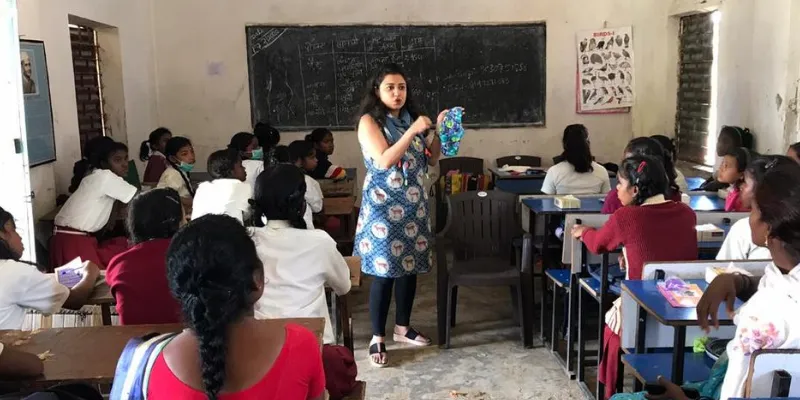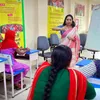This young woman left a corporate job at KPMG to start an NGO that works for empowerment of women and girls
Purvi Tanwani founded ‘Anahat for Change’, a Kolkata-based NGO to empower women through SGHs, and also spread awareness on menstrual health and hygiene.
From assisting chartered accountants in million-dollar deals at KPMG to starting Anahat for Change, an NGO to aid in women’s empowerment, Purvi Tanwani’s life has come a full circle.
The NGO’s initiative “Bleed & Learn Freely” aims to ensure proper Menstrual Hygiene Management (MHM) facilities in schools, and has urged the Department of Higher Education to review the present conditions of school toilets in West Bengal.
It also advocates gender-segregated washrooms with proper doors, wash facilities, vending machines, and proper disposal of sanitary waste, such as incinerators (manual or electric) and dustbins with lids.

Purvi Tanwani, co-founder of Anahat for Change at a workshop
After graduating from Christ University in Bengaluru with a BBA (Hons) degree, Purvi landed a job in Mergers & Acquisition (consultancy) wing of KMPG India.
“My role involved creating data books and assisting managers in due diligence of companies. After a stint of two-and-a-half-years in KPMG, I realised there was not much for me to explore in my current position at work. I quit my job in 2018 and returned to my hometown. In the same year, I co-founded Anahat along with Namrata,” she says.
Addressing gender issues
Anahat, which means “unhurt, unstuck, and unbeaten”, is an organisation working in the space of women empowerment through self-help group (SHG) strengthening, microenterprise development, and vocational training to improve and generate livelihood opportunities for women and adolescent girls.
With sustainability at its core, Anahat propagates the use of resources sustainably and switching to a more sustainable option to protect the environment. It is also working to address gender disparity by addressing gender issues with an aim to end gender-based violence.
The Bleed and Learn Freely campaign was ideated during the Youth Ki Awaaz’s Action Network Workshop on MHM in Jaipur in January 2020.
Explaining the idea behind the campaign, Purvi says, “It has been our general observation that most schools often lack facilities such as clean and safe toilets, proper sanitary pads disposal system, hand washing station, etc., for students to manage their menstruation. Most of the times, incinerators or vending machines installed are non-functional or un-used. The problem is not just with infrastructure availability, the level of knowledge amongst the students regarding menstruation is also very low.”
“All these factors collectively form the reason for absenteeism among adolescent girls. A girl has to spend an average of seven hours a day inside the school premises, making a total of 32 hours a week. She is entitled to safely manage her menstruation in a clean environment,” adds Purvi.
Towards clean toilets
The first thing Purvi planned around the campaign was data collection in schools. She decided to convince government schools in their network to let them interview girls and gather data around sanitation facilities, practices and knowledge of students from classes VI to XII.
Just before the lockdown, they managed to interview 285 students from five schools of West Bengal. They also organised drawing competitions on the topic “My Ideal Toilet” in these schools, and received some amazing illustrations of what students think their “ideal toilet” should look like.
“The campaign has surely helped us start a narrative around WASH in government schools. We faced resistance from teachers and school authorities on tagging Department of Higher Education. We decided to use Anahat’s social media handles to share the beautiful illustrations and demand for rights to hygienic toilets in schools,” she says.
Anahat for Change chose the MH Week to release data regarding menstrual hygiene practices, attitude, and infrastructure availability in West Bengal schools before the lockdown. The data caught the attention of a lot of activists and SRHR consultants, who later reached out to them to know more about the campaign and become an ally.
Going forward, Purvi wants to complete the survey with 1,500 adolescent girls in at least 10 government schools of West Bengal.
“This report will help us reach the decision makers in a systematic way. We are also planning to get eminent NGOs and organisations working in the government school setup to support us in releasing this report and reaching out to the decision makers,” she adds.
As an organisation, Anahat has also reached out to more than 70 government schools in West Bengal with its Happy Period Programme.
The programme aims to question socio-cultural status quo, and provide answers around the topic — menstrual health and hygiene, menstrual product — use, maintenance, and economic viability, environment safety and pollution, and busting myths and taboos around menstruation.
Happy period
Through “Happy Periods Programme”, the NGO also addresses the need for vulnerable women to find valuable and meaningful work. The women employed come from various disadvantaged backgrounds, many students and single mothers trying to support their families.
“These women stitch cloth pads and also promote the use and care of the pads. By employing them, we wish to give them both a source of income, as well as help them learn new skills. We have so far trained more than 100 women from different organisations to stitch cloth pads and other sustainable products,” Purvi says.
Surprisingly, Purvi says, when they were training women from the slums to make cloth pads, they observed the women were interested to make the pads, but were reluctant to use them.
She found that few of them had problems washing and drying the pads in their houses as most of the women came from slums and were using community toilets. These toilets were being shared by 10 families at a time. Drying the pads out in the open was also difficult for them due to the conventional shape of the pads.
“We started training them to make foldable cloth pads, which looks exactly like a handkerchief. These pads were easy to wash and dry out in the open. We also advised them to wash their pads inside their house or on the terrace since most of them had small washing areas attached to the house and a terrace. We soon found that majority of the women switched to cloth pads,” she adds.
Since its inception, Anahat has been a part of two major government projects related to the promotion of menstrual health and hygiene. It was the implementation partner for Lalana — a menstrual hygiene campaign designed by the SDO & IAS officer posted in Arambag, where 100 Asha and Anganwadi workers were trained on menstrual health and hygiene and 80 SHG women to make reusable cloth pads.
Another very similar project Anahat implemented for SDO of Cooch Behar was Mission Bandhavi, where it conducted training for ICDS supervisors, school teachers, students, health supervisors, and other government officials.
Edited by Megha Reddy








